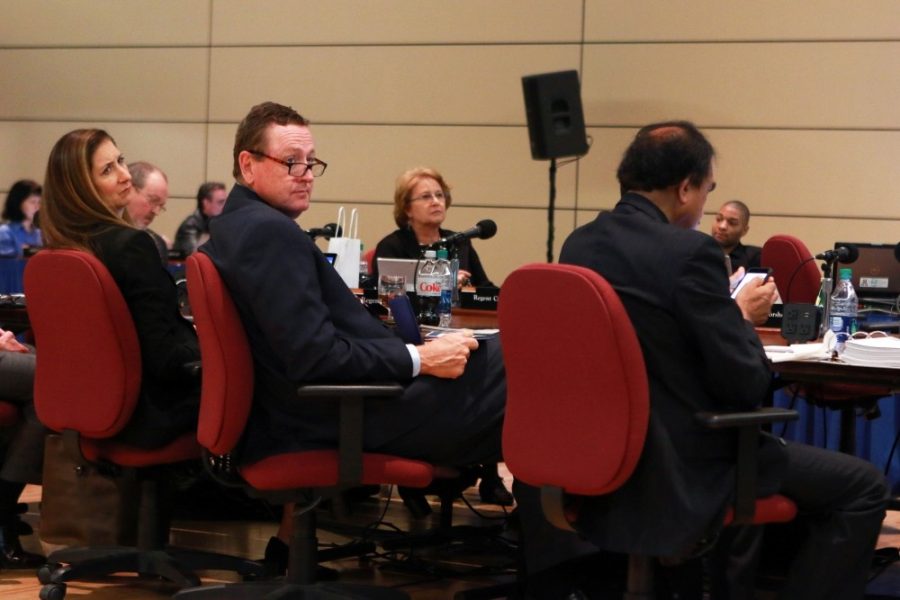The Arizona Board of Regents voted on Jan. 20 to oppose SB 1061, a bill proposing to cap tuition and fee increases at two percent per year at the state’s public universities.
The bill was co-sponsored by nine Republican state senators and one Republican state representative and would significantly restrict the power of the regents and UA to set tuition and fee costs for students.
UA tuition increased 3.2 percent between the 2015-2016 and 2016-2017 school year, more than the 2 percent cap proposed by the bill.
“Students and families have real concerns about tuition and the board shares those concerns,” said Greg Patterson, the regents’ Chair, in a press release.
The bill, which Sen. Sylvia Allen introduced Jan. 12, requires the regents to approve not only all increases in tuition, but also now all fee increases.
“This is nothing against the universities, this is me focusing on what it is going to cost for students and families to educate their child,
Allen said. ”I want predictability for these families.”
The regents could not approve any increase in resident tuition and mandatory fees larger than two percent a year based on the amounts set for the 2016-2017 school year.
The bill also prevents funds gathered from tuition and fees from being used to fund a separate foundation or non-profit.
Eileen Klein, board president, said she understood and shared their concern of the legislatures on tuition costs and college affordability.
“The [regents’] concern was more about the bill itself,” Klein said. “The regents oppose any efforts to regulate tuition in a blanket approach.”
Allen chairs the Senate Education Committee and said she wants an open conversation with the universities and received the inspiration for the bill from Northern Arizona University.
“I am a person of compromise and am open to making this bill even better,” Allen said.
The regents began their conversation on the bill by reaffirming their commitment to keeping tuition low and affordable for in-state students.
“On behalf of students and families, we’ve worked hard to slow tuition increases and put in place innovative programs that create greater tuition predictability,” Patterson said.
RELATED: Arizona Board of Regents on board with Ducey’s state budget proposal
Over the past few years, the regents have increased student involvement and transparency in the tuition-setting process.
At this time, the university presidents are constructing their recommendations for tuition increases. Before the regents begin discussion on these recommendations, they will be released to the public.
“I am concerned that a bill of this nature would undo all the significant work we’ve put in place,” Patterson said.
During the recession, the universities increased tuition by double-digit percentages, Klein said. Over the last few years, the regents have worked to slow the increase in tuition.
RELATED: UA and regents make funding, tuition primary focus of state legislative session
“Tuition should continue to reflect actual needs of the university and students,” Klein said.
The bill codifies a tuition guarantee for undergraduate students so students will pay the same tuition and mandatory fees they paid their freshman year for four consecutive years.
“The regents feel, ultimately, that we need the flexibility to be able to keep the reforms in place that we have made,” Klein said.
According to UA President Ann Weaver Hart, the university is 85 percent tuition-funded. A lack of flexibility in tuition-setting policy on a year-to-year basis could result in a budget shortfall if state funding decreases.
“At a time of a crisis everyone has to chip in and reduce,” Allen said.
Klein said since the regents voted to oppose the bill, the UA and the other public universities can now lobby the legislature to vote to reject the bill.
After Gov. Doug Ducey’s endorsement of the regents’ new student funding model, Klein is optimistic the regents will have a successful session lobbying at the capital.
According to Klein the regents will fight every single day until the budget closes to push their current momentum to obtain more funding for students.
The bill was referred to the Senate Rules Committee and Senate Education Committee on Jan. 12 and received its second floor reading Jan. 17.
Follow Randall Eck on Twitter.








